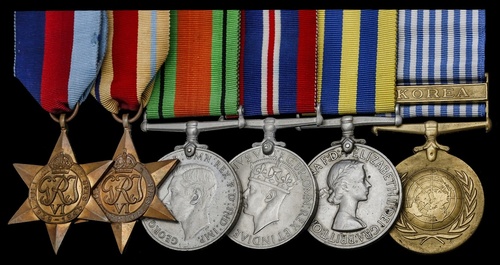
Auction: 17002 - Orders, Decorations and Medals
Lot: 340
A good Second World War and Korean War campaign group of six awarded to Pay Sergeant D. J. Bowen, Royal Army Pay Corps, late The Welch Regiment and South Wales Borderers
Lucky indeed to escape Crete in May 1941, when 1st Battalion, The Welch Regiment was overwhelmed by swathes of enemy paratroopers at Chania, he was less fortunate at Benghazi, where he became P.O.W.: having then served in troubled Eritrea in the South Wales Borderers in the late 1940s, he saw further action with his old regiment in Korea in the period June-November 1952
1939-45 Star; Africa Star; Defence and War Medals 1939-45; Korea 1950-53 (3959873 Sgt. D. J. Bowen, Welch); U.N. Korea 1950-54, generally very fine (6)
David John Bowen was born at Clydark Vale, Rhondda, Glamorgan on 3 July 1919; a small colliery village, Clydark had a sad record of catastrophic mining and flooding tragedies. Young David grew up with Tommy Farr, the British and Commonwealth heavy weight boxer, and although his father was a miner, he decided against 'Going Down The Pit', instead enlisting The Welch Regiment at Pontypridd in December 1938.
Posted to the 1st Battalion in June 1939, he was embarked for Haifa, Palestine and briefly participated in operations of the Arab Revolt (Medal & clasp). The Battalion having then been embarked for Egypt in November 1939, it immediately saw action in the Western Desert operations of 1940, taking part in the initial battles of Sidi Barrani, Bardia and Tobruk against the Italian 10th Army.
Crete and Benghazi
In February 1941, the Battalion was ordered to Crete, where it was overwhelmed by German Paratroopers in bitter fighting near Chania. Bowen was initially reported 'Missing' but avoided capture and managed to get aboard a Royal Navy ship and reported back for duty on the 13 June 1941: he was one of only seven officers and 161 men of the Battalion to have escaped Crete.
Reinforced by a draft of some 700 officers and men, and as part of 5th Indian Infantry Brigade, 4th Indian Division, the battalion next participated in the offensive at Benghazi. Once again it was overrun and suffered severe casualties and this time Bowen was not so lucky: he was taken prisoner.
Confirmed as a P.O.W. by 'Radio Vatican City' in March 1943, he was incarcerated in three camps in Italy - Capua, Bari and Monterrano. Remaining in captivity at the time of Italy's capitulation in September 1943, he was transported by the Germans to Stalag 1VB. Subsequently transferred to Stalag 1VC, he worked in the oil processing plant at Wistritz, Teplitz: the plant was bombed several times between July 1944 and April 1945 and in the second raid on 21 July 1944 six British P.O.W.'s were killed and 21 were injured. The camp was finally liberated by the Russians in May 1945, Bowen being released on 17 June 1945, repatriated to England, and placed on the Army Reserve.
Eritrea and Korea
He rejoined the Colours in November 1947, when he enlisted in the 1st Battalion, South Wales Borderers. In March 1949, the Battalion was deployed to Sudan to become part of the occupation force in Eritrea, a former Italian colony that was ruled by a British military administration. The Battalion's role was to ensure the liberation of the Eritreans and the departure of the Italians. Having earlier gained his Corporal's stripes in July 1948, Bowen reduced to the rank of Private by District Court Martial in Asmara for 'Insubordination' in September 1950.
On returning to the U.K. in early 1951, he was required to change his cap badge back to The Welch Regiment. Following attendance of the Battle Training Group in Japan in the summer of 1952, he joined his old regiment in the field and remained actively employed until the year's end. A tour of duty in Hong Kong followed and he returned to the U.K. in late 1953.
Postscript
In February 1954, Bowen was posted to Fulford Barracks, H.Q. N.W. District, Preston in an Extra Regimental Appointment and in February 1956 he transferred to Royal Army Pay Corps in the acting rank of Sergeant. Following periods of attachment to the Royal Artillery and Lancashire Fusiliers in B.A.O.R. - as Pay Sergeant - he took his discharge in July 1962, when his conduct was described as 'Exemplary'. He died at Whiston in January 1975; sold with copied research.
Subject to 20% VAT on Buyer’s Premium. For more information please view Terms and Conditions for Buyers.
Sold for
£300




